|
|
|
Sort Order |
|
|
|
Items / Page
|
|
|
|
|
|
|
| Srl | Item |
| 1 |
ID:
185096
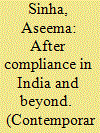

|
|
|
|
|
| Summary/Abstract |
Using India as a theory building case, this paper puts forward a theoretical framework for understanding countries’ responses to global rules and implementation effects across diverse global governance regimes and contexts. The initial premise for this paper is that the strategic structure of implementation dilemmas faced by states and actors within countries need to be understood in addition to design dilemmas. Successful global regimes must not only solve cooperation and uncertainty problems at the initial stages in choosing the right institutional matrix, but also ‘require changes in domestic institutions.’ The need to change domestic institutions creates certain implementation dilemmas. These dilemmas are a joint product of the institutional design, specific policy issue and the domestic logic of responses after international agreements have been signed. This broader idea helps understand a wide variety of India’s interactions across global governance institutions. I also suggest a novel empirical strategy of cross-institutional analysis to assess implementation dilemmas. While we have numerous cross-national studies of how compliance occurs in a wide variety of countries, we lack theory-driven, empirically grounded, comparative studies of a single country or a group of countries across diverse global regimes. Such a framework can help us better understand how countries interact with a variety of global institutions and the reciprocal effects. This framework is then used to understand India’s interactions with diverse global regimes in an illustrative manner in this article, and in greater detail by other authors in the section published in this issue of Contemporary South Asia.
|
|
|
|
|
|
|
|
|
|
|
|
|
|
|
|
| 2 |
ID:
185091
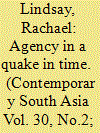

|
|
|
|
|
| Summary/Abstract |
This article explores agency through humour and time amongst a group of Pakistani young men who reside, or recently resided, in a refugee shelter for unaccompanied minors in Athens, Greece. It asks how their jokes about alternate futures might challenge the slow, structural violence which places these young men on the margins of society in terms of work, space, and temporality. Despite a lack of anthropological work on humour, particularly amongst migrant communities, this article takes up humour as an analytical tool due to its pervasive presence in the shelter and its challenge to the discourse of victimhood of migrant children. I ultimately argue that conventional theories about the role of humour fail to fully account for the temporalities that these jokes around futurity evoke. This article also sheds light on the various constructs of time at play within the lives of these young men and how these are disrupted in the moment of the joke. It asks what modalities of agency emerge during these jokes when we employ Deleuze’s non-linear syntheses of time and seeks, ultimately, to look beyond conventional assumptions of youth agency and structural inequality, and to question the premises upon which such conventions are built.
|
|
|
|
|
|
|
|
|
|
|
|
|
|
|
|
| 3 |
ID:
185100
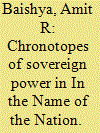

|
|
|
|
|
| Summary/Abstract |
This article is part of a Book Forum review of Sanjib Baruah’s book In the Name of the Nation: India and its Northeast (2020). The Book Forum consists of individual commentaries on this text by five interested scholars, followed by a response by the author. The article may be read individually or alongside the other contributions to the Forum, which together constitute a comprehensive discussion of the themes and arguments in the book.
|
|
|
|
|
|
|
|
|
|
|
|
|
|
|
|
| 4 |
ID:
185104


|
|
|
|
|
| Summary/Abstract |
This article is part of a Book Forum review of Sanjib Baruah’s book In the Name of the Nation: India and its Northeast (2020). The Book Forum consists of individual commentaries on this text by five interested scholars, followed by a response by the author. The article may be read individually or alongside the other contributions to the Forum, which together constitute a comprehensive discussion of the themes and arguments in the book.
|
|
|
|
|
|
|
|
|
|
|
|
|
|
|
|
| 5 |
ID:
185103


|
|
|
| 6 |
ID:
185092
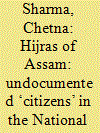

|
|
|
|
|
| Summary/Abstract |
This paper presents the case of hijras of Assam who are undocumented in the National Register of Citizens because of their fractured identity and adopted gender and face the risk of being declared illegal immigrants despite being citizens. The paper focuses on how transgender individuals are excluded from different aspects of citizenship as a consequence of document-focused procedures created and enforced by the state. The primary argument is that document-focused procedures of the modern state, rooted in heteronormative underpinnings, are exclusionary for transgender individuals.
|
|
|
|
|
|
|
|
|
|
|
|
|
|
|
|
| 7 |
ID:
185101


|
|
|
|
|
| Summary/Abstract |
This article is part of a Book Forum review of Sanjib Baruah’s book In the Name of the Nation: India and its Northeast. The Book Forum consists of individual commentaries on this text by five interested scholars, followed by a response by the author. The article may be read individually or alongside the other contributions to the Forum, which together constitute a comprehensive discussion of the themes and arguments in the book.
|
|
|
|
|
|
|
|
|
|
|
|
|
|
|
|
| 8 |
ID:
185095
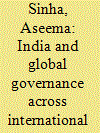

|
|
|
|
|
| Summary/Abstract |
India’s rising power and status within a variety of global institutions is well explained with the help of an inside-out approach, with a focus on India’s domestic compulsions and strategies. This special section of four articles in Contemporary South Asia deepens this inside-out analysis, combining it with an outside-in approach to global institutions which explore how the global regime in question shapes and interacts with domestic impulses and dilemmas. The four papers explore India’s approach and actions across a divergent set of global institutions such as the IMF, the WHO, and maritime governance in a regional context, showing how the institutional and geopolitical context matters to understanding India’s diverse actions and strategies. These articles also explore the evolving process of compliance and implementation within each specific global institutional context. Such a comparative approach allows us to understand how the specific institutional design of the relevant organization or the structure of the global regime affects India. In this introduction to the special section, I outline the advantages of an interactive, comparative approach, exploring India’s varying actions across a variety of issue areas and global contexts. Such a variegated and differential analysis across global regimes is valuable for a more complete and differentiated analysis of India’s rise.
|
|
|
|
|
|
|
|
|
|
|
|
|
|
|
|
| 9 |
ID:
185099
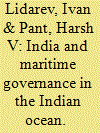

|
|
|
|
|
| Summary/Abstract |
The article argues that geopolitics is a major obstacle to an effective Indian policy on substantive maritime governance. It holds that India’s involvement in maritime governance is predominantly shaped by geopolitics and driven by two geopolitical concerns, Delhi’s drive to counter China’s expanding influence in the Indian Ocean Region (IOR) and India’s pursuit of leadership in that region. This emphasis on geopolitics is perfectly reasonable from India’s perspective but comes at the cost of constraining Delhi’s maritime governance policy and reducing India’s ability to address substantive maritime governance issues. Hence, India’s focus on geopolitics undermines substantive maritime governance. The focus on geopolitics negatively impacts substantive maritime governance because it: 1) leads India to oppose China’s involvement in IOR’s maritime governance; 2) creates bureaucratic obstacles to India’s substantive maritime governance; 3) constrains Delhi’s ability to concentrate its substantive maritime governance efforts.
|
|
|
|
|
|
|
|
|
|
|
|
|
|
|
|
| 10 |
ID:
185098
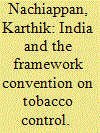

|
|
|
|
|
| Summary/Abstract |
This paper investigates why India actively negotiated and ratified the Framework Convention on Tobacco Control (FCTC), the first global health treaty to curb tobacco use worldwide. The World Health Organization’s (WHO) decision to conduct FCTC negotiations aligned with India’s shifting disease burden that was pivoting from infectious to non-communicable diseases, particularly cancer, which shot up due to surging tobacco use. The WHO’s decision to frame the agreement around constraining global tobacco commerce, particularly the might of multinational tobacco companies, meshed with the interests of New Delhi, which was concurrently seeking to curb surging tobacco consumption. This triggered a positive approach and attitude to FCTC negotiations, leading to India’s ratification. India’s negotiation and ratification of the FCTC shows that the literature(s) on rising powers and international organizations must consider how factors like the WHO’s institutional politics, specifically the intent to negotiate a focused global agreement to curb tobacco production and distribution worldwide, affects how countries perceive and seek to use that agreement to bolster domestic policy concerns like tobacco control.
|
|
|
|
|
|
|
|
|
|
|
|
|
|
|
|
| 11 |
ID:
185097


|
|
|
|
|
| Summary/Abstract |
How do rising powers engage with international institutions? While this question has remained important, we have very few theoretically grounded, empirical studies that look at this engagement. This paper seeks to address that gap by focusing on India's engagement with the International Monetary Fund (IMF). It argues that rising powers engage with the institution's distinctive design, seeking to change features such as the rules for controlling the institution. The issues the institution covers matter: the nature of the issue area can facilitate engagement. For example, in the case of India's engagement with the IMF, the technical nature of the issue arena provided autonomy to the executive and facilitated the process of formulating and implementing its strategy. The Indian executive has engaged mostly with formal rules during the period under review. Contrary to expectations that status-quoist institutions will normally discourage states from seeking change, the paper finds that India expended its resources to influence quota reform.
|
|
|
|
|
|
|
|
|
|
|
|
|
|
|
|
| 12 |
ID:
185089


|
|
|
|
|
| Summary/Abstract |
This article explores the rise of Christianity in urban Nepal through the lens of rural to urban migrants and their experiences. As Christianity continues its exponential growth in the Kathmandu Valley, especially among socially and culturally marginalized groups, the article provides theoretical indicators of what is driving the phenomenon. The article explores the motivations for Christian conversion through a comparative methodology: it compares rural-to-urban migrants who converted to Christianity with those who did not and remained Hindu. Interviews with these two groups (conducted from 2018 to 2021) open a window onto the perceived benefits of Christian conversion. The empirical findings are framed through sociological theories of conversion. Interviews show that Christian conversion in urban Nepal is associated with the development of new forms of sociality that assist newcomers to the city adjust to a larger, more anomic environment. Survey findings are supplemented by reports of Christian worship services from various churches in the Kathmandu Valley. The article ends by exploring possible reactions from mainstream Hinduism in Nepal, arguing that Hinduism in Nepal has not yet evolved in the direction of India’s populist hindutva but that among the professional classes personalistic forms of Hindu belief are flourishing.
|
|
|
|
|
|
|
|
|
|
|
|
|
|
|
|
| 13 |
ID:
185093


|
|
|
|
|
| Summary/Abstract |
The threat of statelessness has the potential to be realized anew in India with the announcement of the impending National Register of Citizens (NRC). It has propelled this populous democracy once again into controversy. The importance of this announcement in conjunction with the 2019 Citizenship Amendment Act (CAA) cannot be overstated. We draw on the case of Assam for its potential to predict the implications and consequences of a pan-national register of citizens and the threat of detention, deportation, and large-scale rendering of statelessness for those excluded from the drafts. We stress the need for India to take incremental steps to establish transparent procedures and a clear trajectory for persons rendered stateless in situ by this state project.
|
|
|
|
|
|
|
|
|
|
|
|
|
|
|
|
| 14 |
ID:
185090
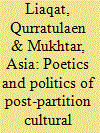

|
|
|
|
|
| Summary/Abstract |
The term ‘cultural memory’ signifies a shared memory of a group of people inhabiting a common geographical location with a mutual understanding of religion, culture, and society. While fiction, non-fiction, and fine arts are used for archiving, reconfiguring, and reflecting on the communal memories that are historically, culturally, and politically significant, artefacts such as paintings and photographs are used to keep accurate historical records. This study argues that Kamila Shamsie’s novel Kartography (2002) is a literary rendition that fictionalises the most relevant collective memories of post-Partition Pakistan by providing a new perspective on resolving the political, ethnic and sectarian issues in a postcolonial community. The textual analysis of the novel, in association with cultural memory theoretical perspectives, reveals that it is a ‘mythistorical’ text that mythologises the history of Pakistan. The characters have been personified and condensed into ethno-racial stereotypes. The city of Karachi has been reconstructed into a literary chronotope, and human relationships have been used as metaphors to revisit the political mistakes of the past. Hence, this text is not only an artistic mimesis of post-Partition Pakistan’s ‘cultural memory’, but also a promulgation of a cultural change required for a more cohesive and peaceful South Asian regional politics.
|
|
|
|
|
|
|
|
|
|
|
|
|
|
|
|
| 15 |
ID:
185105


|
|
|
|
|
| Summary/Abstract |
This article is part of a Book Forum review of Sanjib Baruah’s book In the Name of the Nation: India and its Northeast (2020). The Book Forum consists of individual commentaries on this text by five interested scholars, followed by a response by the author. The article may be read individually or alongside the other contributions to the Forum, which together constitute a comprehensive discussion of the themes and arguments in the book.
|
|
|
|
|
|
|
|
|
|
|
|
|
|
|
|
| 16 |
ID:
185094


|
|
|
|
|
| Summary/Abstract |
In 1992 the 73rd amendment to the Indian constitution called on states to create and empower rural local governments. Despite the amendment, however, there is variation in the extent of decentralization of power from states to rural local governments in the country. How has this process of decentralization influenced health outcomes in India? The research note addresses this question by collecting preliminary data on political, administrative and fiscal decentralization and examining trends in different dimensions of decentralization and infant mortality rates among select states (Assam, Rajasthan, Kerala and Tamil Nadu) from 1994 to 2017. These states display disparities in the outcome of interest and infant mortality, and have income levels that do not explain all the variation in infant mortality trends. Preliminary results demonstrate the need to adopt a multidimensional approach toward studying the consequences of decentralization.
|
|
|
|
|
|
|
|
|
|
|
|
|
|
|
|
| 17 |
ID:
185102


|
|
|
|
|
| Summary/Abstract |
This article is part of a Book Forum review of Sanjib Baruah’s book In the Name of the Nation: India and its Northeast (2020). The Book Forum consists of individual commentaries on this text by five interested scholars, followed by a response by the author. The article may be read individually or alongside the other contributions to the Forum, which together constitute a comprehensive discussion of the themes and arguments in the book.
|
|
|
|
|
|
|
|
|
|
|
|
|
|
|
|
|
|
|
|
|